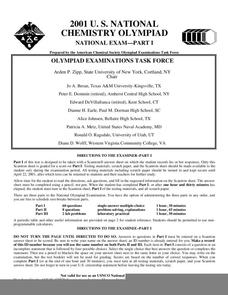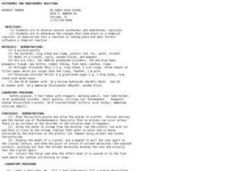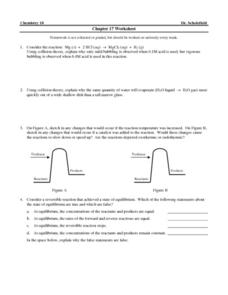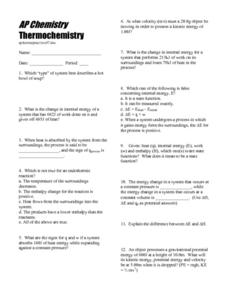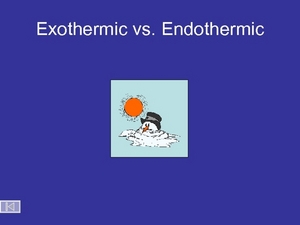Curated OER
2007 U.S. National Chemistry Olympiad Local Section Exam
Sixty multiple choice questions cover the entire gamut of chemistry concepts. This is the local section of the U.S. National Chemistry Olympiad, where your chemistry candidates take a shot at entering the national competition. They...
Curated OER
2001 U.S. National Chemistry Olympiad Part I
Sixty multiple-choice questions test on a variety of first year chemistry subjects. In order to succeed, exam takers must be competent with properties of elements, stoichiometry problems, gas laws, bond dissociation, and types of...
Curated OER
Vocabulary-Energy and Matter
In this energy and matter worksheet, students define 28 terms related to moles, matter, energy, the Law of Conservation of Energy, mass, properties of matter and states of matter.
Curated OER
Chemical Reactions and Energy
The details here give definitions about chemical reactions and the energy transfer in those reactions. The reactions given include general examples of catalysts, inhibitors, and other situations that affect the rate of production and...
Curated OER
More Thermochemistry Problems
This two-page assignment covers basic thermochemistry concepts. Chemistry learners identify exothermic and endothermic processes, explain a phase change graph, and draw an energy level diagram. There are no problems to solve, just...
Curated OER
Activation Energy
Students investigate activation energy through endothermic and exothermic reactions. In this activation energy lesson plan, students conduct 2 experiments, one is an endothermic reaction and the other is an exothermic reaction. Students...
Curated OER
Exothermic and Endothermic Reactions
Students observe demonstrations of exothermic and endothermic reactions and determine the changes that take place in a chemical reaction. Students observe four demonstrations showing entropy, attraction of molecules due to polarity,...
Curated OER
Energy Changes, Rates of Reactions, Nuclear Chemistry
In this energy changes, rates of reactions and nuclear chemistry activity, students solve 14 problems to review concepts about endothermic and exothermic reactions, heat of combustion, heat of reactions, enthalpy, kinetic and potential...
Curated OER
Chapter 17 Worksheet- Equilibrium
In this equilibrium learning exercise, students answer eleven questions about chemical reactions, equilibrium concentrations and endothermic and exothermic reactions. They write equilibrium expressions for chemical reactions and they...
Curated OER
AP Chemistry-Thermochemistry
In this thermochemistry worksheet, students answer twenty multiple choice questions about heat, enthalpy changes, thermal, mechanical and electrical energy and the laws of thermodynamics.
Curated OER
Exothermic vs. Endothermic
The PowerPoint opens with video footage of the decomposition of nitrogen triiodide and then explains it with diagrams. Graphs of exothermic and endothermic reactions are exhibited, as well as one for the effect of a catalyst on reaction...
Curated OER
Chemical Equations
In this chemical equations worksheet, students complete a paragraph by filling in the 17 terms associated with chemical equations.
Curated OER
Chemical Equations
In this chemical equations instructional activity, high schoolers complete a paragraph about chemical equations by filling in 17 terms from a word list.
Curated OER
Chemistry Equilibrium Worksheet
This worksheet focuses on writing equilibrium constants. High schoolers work to determine the direction of reactions, concentrations of different substances, and equilibrium constants.
Curated OER
Oxidation and Combustion: Chemical Reactions in Fire
Students investigate the art and science of pyrotechnics. In this chemistry and computer lesson plan, students learn about the chemical basis of fire and structure of fireworks. Students then apply their knowledge...
Curated OER
Physical vs. Chemical
In this physical vs. chemical change activity, students answer 10 questions about identifying chemical and physical changes. They identify exothermic and endothermic reactions and the parts of a chemical equation. Students answer 1...
Curated OER
Kinetics and Equilibrium
In this kinetics and equilibrium learning exercise, students use the diagram to answer the questions as it relates to endothermic or exothermic reactions. Students indicate the result in the reaction rate as speeding up or slowing down.
Curated OER
Equilibrium, Enthalpy and Entropy
In this chemical reactions worksheet, students determine what is true about a system at equilibrium and give examples of macroscopic properties. Students determine minimum enthalpy and maximum entropy for reactions. This worksheet has 2...
Curated OER
Free Energy Formula
In this chemical reaction worksheet, students use the free energy formula to determine if reactions are spontaneous or not. This worksheet has 5 problems to solve.
Curated OER
Exothermic and Endothermic Changes
Students define and identify endothermic/exothermic reactions. Using a series of experiments, they construct and interpret potential energy diagrams for their reactions.
Curated OER
Heat Loss and Gain in Physical Changes and Chemical Reactions
Students compare and contrast exothermic and endothermic reactions. In this chemistry lesson, students perform experiments to determine whether heat was released or absorbed in a reaction. They share their observations in class.
Texas Education Agency
Texas Gateway: Thermochemical Equations
Given descriptions, diagrams, scenarios, or chemical symbols, students will calculate the energy changes and identify exothermic and endothermic reactions.
American Chemical Society
Middle School Chemistry: Energy Changes in Chemical Reactions
Students will conduct two chemical reactions: endothermic and exothermic. They will see an animation that shows that it takes energy to break bonds and that energy is released when new bonds are formed, and use that animation to explain...
Texas Instruments
Texas Instruments: Something's Fishy
In this activity, students examine the size, mass, and growth rates for three species of fish. They interpolate and extrapolate from best-fit models. Students compare the growth rates of endothermic and exothermic animals.



